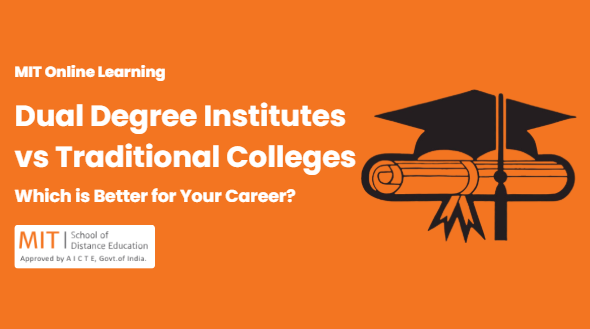
Choosing the right higher education path can be challenging, especially when deciding between dual degree institutes and traditional colleges. With the evolving demands of the global job market, students are increasingly exploring alternative education models that can give them a competitive edge. In this blog, we’ll break down the differences, advantages, and limitations of both dual degree colleges and traditional colleges to help you make an informed choice.
What Are Dual Degree Institutes vs Traditional Colleges?
Dual degree institutes offer programs that allow students to earn two degrees simultaneously, often combining complementary fields such as Management and Technology or Finance and Data Analytics. These courses are designed to equip students with diverse skill sets, making them versatile in multiple industries.
On the other hand, traditional colleges typically focus on a single discipline, providing depth of knowledge in one field. While they offer a structured academic environment and well-established reputations, they may not always cater to the growing need for interdisciplinary expertise.
Key Difference: Dual degree institutes emphasize breadth and versatility, whereas traditional colleges focus on depth and specialization.
How Do Dual Degree Courses Boost Career Growth?
Dual degree courses are structured to provide a competitive advantage in the job market. Here’s how:
- Enhanced Skill Set: By studying two disciplines simultaneously, students gain diverse competencies, making them valuable assets in multi-functional roles.
- Faster Career Progression: Employers often recognize the additional expertise, which can translate into promotions or leadership opportunities faster than single-degree graduates.
- Global Opportunities: Many dual degree programs have international affiliations, providing exposure to global practices and collaborations.
For instance, a student completing a dual degree in Business Management and Data Analytics is better positioned for roles that require both strategic decision-making and data-driven insights—a combination increasingly in demand today.
Do Employers Prefer Graduates from Dual Degree Colleges?
Employers are becoming more receptive to dual degree graduates, particularly for roles requiring interdisciplinary knowledge. Here’s why:
- Adaptability: Dual degree students are trained to handle multiple domains, making them adaptable to changing business environments.
- Problem-Solving Skills: Exposure to varied subjects enhances analytical and critical thinking abilities.
- Leadership Potential: Graduates from dual degree colleges often have experience balancing complex workloads, an essential trait for managerial positions.
However, it’s important to note that while dual degrees add value, employers still prioritize skills, experience, and relevant certifications alongside academic credentials.
Which Is More Cost-Effective: Dual Degree Courses or Traditional Degrees?
One of the first questions students often ask is about affordability.
Dual Degree Courses:
- Often have higher tuition fees due to the extended curriculum.
- It can save time compared to pursuing two separate degrees sequentially, reducing living expenses and opportunity costs.
Traditional Degrees:
- Typically more affordable in terms of tuition per program.
- Additional specialization may require further education, increasing overall costs over time.
Ultimately, dual degree colleges can be more cost-effective for ambitious students who want to maximize skills and credentials in a shorter time frame.
How Do Learning Styles Differ in Dual Degree Institutes?
Learning in dual degree institutes is often more dynamic and application-oriented. Key differences include:
- Interdisciplinary Projects: Students frequently work on projects combining knowledge from both degrees.
- Collaborative Learning: Emphasis on teamwork and peer learning across disciplines.
- Time Management Skills: Balancing two programs requires high organizational skills and self-discipline.
Traditional colleges, in contrast, may follow a more linear curriculum with a stronger focus on theory and in-depth study within a single field.
Can Dual Degree Colleges Give a Job Market Advantage?

Yes, dual degree courses can provide a noticeable advantage in the job market:
- Diverse Opportunities: Graduates can apply for positions in multiple sectors, increasing employability.
- Higher Starting Salaries: Specialized dual skills often lead to better compensation packages.
- Networking Potential: Exposure to two fields expands professional networks and industry connections.
This advantage is especially relevant in competitive industries like IT, Finance, and Business Management, where interdisciplinary knowledge is highly valued.
What Are the Benefits of Traditional Colleges Over Dual Degree Institutes?
Traditional colleges are still preferred by many students for several reasons:
- Established Reputation: Many traditional colleges have a longstanding brand value and recognition.
- Focused Expertise: Students gain in-depth knowledge in a single field, which can be advantageous in specialized careers.
- Extracurricular & Alumni Networks: Traditional colleges often have extensive alumni networks and extracurricular programs, helping in career growth.
For students seeking deep expertise and strong local or industry connections, traditional colleges remain a viable and respected choice.
How Do Internship Opportunities Compare in Dual Degree Courses?
Internships play a critical role in career development, and the approach differs between dual degree and traditional programs:
Dual Degree Colleges:
- May offer internships that combine both fields, providing real-world exposure to multi-disciplinary roles.
- Encourage students to undertake multiple internships, increasing industry readiness.
Traditional Colleges:
- Typically, focus internships within the core discipline.
- Students may have fewer options to explore crossover opportunities without additional certifications.
For students aiming to stand out in a competitive job market, dual degree colleges often provide a richer internship experience.
Which Offers More Flexibility: Dual Degree Institutes or Traditional Colleges?
Flexibility is another key consideration:
- Dual Degree Institutes: Many offer online, part-time, or hybrid learning options, accommodating working professionals or students with other commitments.
- Traditional Colleges: More rigid schedules, often requiring full-time on-campus attendance.
This makes dual degree courses particularly attractive for students seeking to balance education with professional or personal responsibilities.
Are Dual Degree Courses Worth It for Long-Term Careers?
The long-term value of dual degree courses depends on individual career goals:
- Career Advancement: Dual degree graduates often move into managerial and strategic roles faster.
- Versatility: The ability to pivot between industries or roles provides long-term security.
- Continual Learning: Exposure to multiple disciplines fosters lifelong learning habits, which are critical in today’s rapidly evolving job market.
For ambitious students aiming for leadership positions or interdisciplinary careers, dual degree courses are generally a smart investment.
How MITSDE Supports Dual Degree Aspirants
For students considering dual degree courses, MITSDE stands out as a premier option. MITSDE’s dual degree programs are designed to combine academic rigor with practical skills, ensuring students gain both theoretical knowledge and real-world experience.
- Flexible Learning: Offers online and distance dual degree courses, enabling working professionals to pursue education without interrupting their careers.
- Industry-Relevant Curriculum: Courses are tailored to meet industry demands, helping students stay ahead in competitive job markets.
- Career Support: MITSDE provides placement assistance, internships, and mentorship programs to boost employability.
- Global Exposure: Some programs include international collaborations, widening career opportunities.
Choosing a dual degree from MITSDE can be a strategic step for students aiming to enhance skills, expand career options, and achieve professional growth efficiently.
Conclusion
When it comes to choosing between dual degree institutes and traditional colleges, there’s no one-size-fits-all answer. Dual degree courses are ideal for ambitious students seeking versatility, faster career progression, and cross-disciplinary expertise. Traditional colleges, however, offer deep specialization, established reputations, and strong alumni networks.
For students looking to maximize career opportunities while gaining diverse skills, enrolling in a dual degree program at MITSDE can be a game-changer. With flexible learning, industry-relevant courses, and career support, MITSDE ensures that your investment in education translates into long-term professional success.



